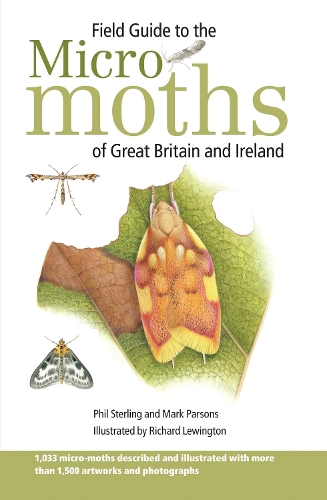
Field Guide to the Micro-Moths of Great Britain and Ireland
(Paperback)
Available Formats
Paperback
Published: 1st December 2018
Paperback, 2nd edition
Published: 3rd April 2024
Hardback, 2nd edition
Published: 3rd April 2024
Publishing Details
Field Guide to the Micro-Moths of Great Britain and Ireland
By (Author) Dr Phil Sterling
By (author) Mark Parsons
Illustrated by Richard Lewington
Bloomsbury Publishing PLC
Bloomsbury Wildlife
1st December 2018
United Kingdom
Classifications
General
Non Fiction
595.780941
Physical Properties
Paperback
416
802g
Description
One of the most eagerly anticipated insect guides for years This is the most comprehensive field guide to micro-moths ever published in a single volume, and, for the first time, makes this fascinating and important group of insects accessible to the general naturalist. The guide covers 1,033 species, with more than 1,500 superbly detailed artworks and photographs. It also includes 900 specially commissioned maps. Written by a team of moth experts under the editorship of Phil Sterling, it provides coverage of all the micro-moth families found in Great Britain and Ireland, including the Channel Islands. Species descriptions include field characters, similar species, flight season, habitat, larval foodplants, status and distribution. The general introduction covers identifying, studying and finding micro-moths, including field techniques, and there is also a series of innovative keys to families and genera, as well as a comprehensive checklist incorporating the latest thinking on taxonomy.
Reviews
An essential reference for all moth enthusiasts everywhere * ukmoths *
Here, at long last, is a warm and inviting introduction to the broad subject of British microlepidoptera -- Steve Whitehouse * Birdguides *
This new guide is a huge leap forward in making micros accessible to a wider public -- Neil Bowman * Birdwatch *
Author Bio
Phil Sterling began his interest in moths before starting school, and developed his passion for micro-moths as a teenager. He holds the degree of MA (Oxon) in Zoology and his DPhil (Oxon) was on the ecology and biological control of the Brown-tail Moth. He is a Fellow of the Royal Entomological Society, and a member of the British Entomological and Natural History Society and British Ecological Society. He has worked in nature conservation research and practice for 30 years and is currently the lead ecological advisor for Dorset County Council. He has written and contributed to many publications, mainly on British micro-moths. Mark Parsons was born in Eastbourne, Sussex, and started recording moths in the long hot summer of 1976. He has a BSc in Biology, is a Fellow of the Royal Entomological Society and is a member of the British Entomological and Natural History Society and the Societas Europae Lepidopterologica. He has worked as an entomologist for the Nature Conservancy Council and the Joint Nature Conservation Committee, as well as a lepidopterist at the Natural History Museum, London. Currently based in Dorset, he has worked for Butterfly Conservation since 1999 overseeing their moth conservation efforts. He has produced many notes and articles in entomological journals, and authored or co-authored many papers and other publications on Lepidoptera and Lepidoptera conservation. Over almost forty years, RichardLewington has built up a reputation as one of Europes finest wildlife illustrators. He first became interested in butterflies as a child when he inherited a cabinet of insects from his father. He studied graphic design at the Berkshire College of Art, and since leaving in 1971 has specialised in natural-history illustration. His meticulous paintings of insects and other wildlife are the mainstay of many of the modern classics of field-guide art, including Insects of Britain and Western Europe, Collins Butterfly Guide, Field Guide to Dragonflies of Britain and Europe, Field Guide to the Moths of Great Britain and Ireland, Pocket Guide to Butterflies of Britain and Ireland and Guide to Garden Wildlife. He was, for many years, the principal artist on the multi-volume series, The Moths and Butterflies of Great Britain and Ireland. He has also designed and illustrated wildlife stamps for a number of countries, including a set of ten stamps of British butterflies for Royal Mail in 2013.
